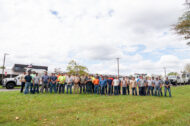Irrigation packs a big payback for farmers in rural Indiana. Yield more than doubles when you turn on the spigot, jumping from 80 or 90 bushels per acre to more than 200. And, water isn’t the only thing that flows. So do the electrons that power pivot irrigators, which use powerful motors — up to 125 HP — to pump groundwater up to the surface. Not surprisingly, this technology can consume as much energy as commercial loads.
For Noble REMC, that irrigation load rose dramatically between 2006 and 2014, when the number of irrigation systems powered by the cooperative jumped an average of 17 percent each year. The kWh growth associated with these systems shot up an average of 32.7 percent annually.
Meanwhile, Wabash Valley Power Association (WVPA), the wholesale electricity provider that supplies Noble REMC, was offering a new load-shedding program that would have given Noble and its members significant savings. But, the distribution co-op didn’t have a way to participate. In fact, even its 30-year-old program that controlled 3,000 water heater loads ended in January 2013, when FCC narrow banding requirements left the communications network obsolete.
At the same time, Noble also was shopping for a metering system to replace power-line technology that had reached end of life. “We were having to go out and read 600 meters manually every month, said Douglas Dickmeyer, manager of engineering and operations for the REMC. “We’d started looking for an AMI system, and we put the means of controlling irrigation customers on our list of requirements.” Read More.


